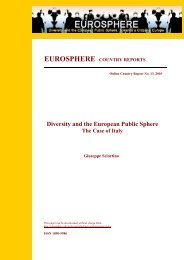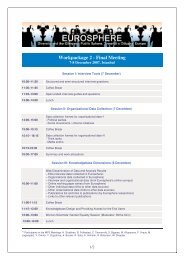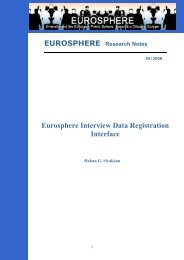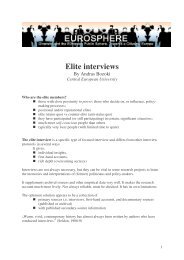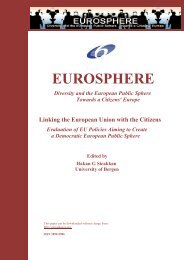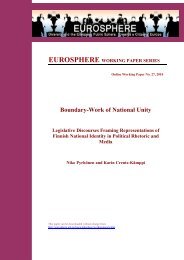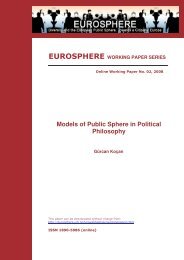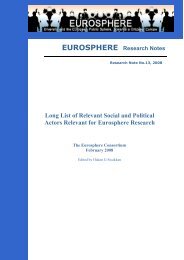Migrants, Minorities, Belongings and Citizenship. Glocalization and ...
Migrants, Minorities, Belongings and Citizenship. Glocalization and ...
Migrants, Minorities, Belongings and Citizenship. Glocalization and ...
Create successful ePaper yourself
Turn your PDF publications into a flip-book with our unique Google optimized e-Paper software.
● Characteristics of transnational spaces in terms of the degree <strong>and</strong> intensity of crossborder<br />
co-operation, loyalty constructions, participation, voice, <strong>and</strong> access.<br />
● Types of interplays between glocal, transnational, <strong>and</strong> traditional channels of voice,<br />
participation, <strong>and</strong> access in terms of exchanges of people, double roles, formation<br />
<strong>and</strong> transfer of values <strong>and</strong> ideas, mutual influence <strong>and</strong> interference.<br />
● Types of national <strong>and</strong> supranational policy tools <strong>and</strong> social conditions that affect the<br />
formation <strong>and</strong> persistency of misalignments, <strong>and</strong> glocal, transnational, <strong>and</strong><br />
traditional channels of voice, participation, <strong>and</strong> access to public arenas.<br />
● Similarities <strong>and</strong> differences between participation, voice <strong>and</strong> access forms of<br />
citizens, historical-native minorities, second <strong>and</strong> third country nationals, <strong>and</strong> extra-<br />
European citizens residing in second countries at the micro-level.<br />
In this exploratory phase, the project has designed the QC-CITBASE <strong>and</strong> has stored the<br />
collected qualitative comparative data in a st<strong>and</strong>ard format coded in form of discrete <strong>and</strong><br />
ordinal variables. The technical features of this database are:<br />
- comparative across cases (i.e. enablingstorage of information in a st<strong>and</strong>ard format);<br />
- comparative across variables (i.e. allowing aggregation <strong>and</strong> quantification);<br />
- context-sensitive (i.e. allowing storage of conditions non-existent in other cases);<br />
- updateable over time (i.e. allowing storage of new data cumulatively);<br />
- extendable to other small/big countries (i.e. allowing addition of data from new<br />
cases);<br />
- extendable to new variables (i.e. allowing quantification <strong>and</strong> recoding);<br />
- comprising descriptive as well as analytical data;<br />
- user-friendly.<br />
It is important to note that the data are not collected from samples that are statistically<br />
representative. The reason for this is that the project was exploratory <strong>and</strong> qualitatively<br />
oriented already from the beginning. With the qualitative data available in Glocalmig, this<br />
database is primarily a qualitative database which allows micro-levels of analysis.<br />
However, the database is designed in such a way that, if data from statistically<br />
representative samples are stored in it, it can also be used as a quantitative database in<br />
52



